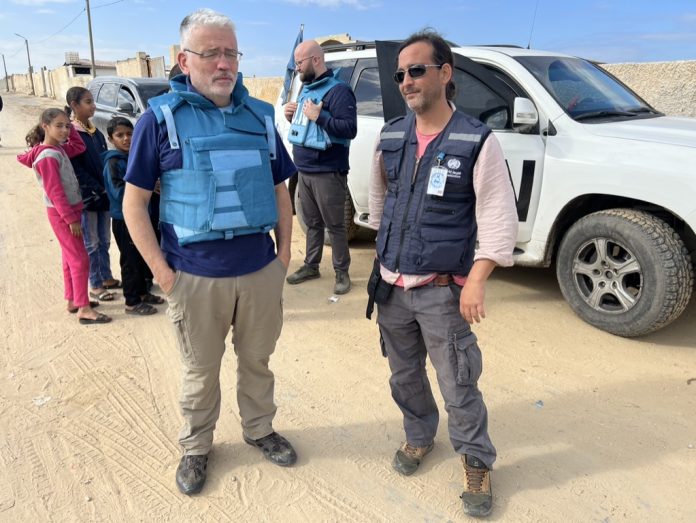An East Midlands nurse has recounted the dramatic moment he helped save the life of a three-year-old Palestinian girl with a bullet lodged in her neck after it had ricocheted through her mother’s body.
Medic David Anderson, from Rutland, spent six months last year in war-torn Gaza as part of the UK Government’s humanitarian response – and is celebrating being awarded an OBE in the King’s New Year Honours List.

David Anderson is the Disaster and Conflict Lead for the Manchester-based frontline charity UK-Med.
He played a key role in helping establish two Foreign, Commonwealth & Development Office (FCDO)-funded emergency field hospitals – based in Al Mawasi and Deir El Balah – which have treated more than 350,000 patients.

The 55-year-old admits the constant sound of bomb blasts now almost feels like “background noise” – but he could never have imagined the horrors of war he witnessed.
David said: “You see so many difficult or dramatic injuries – arms, legs, multiple amputations, and quite a lot of cases where bullets have ripped through the abdomen.
“We treated a three-year-old girl with a bullet in her neck. The bullet had passed through the family’s makeshift tent, passed transversely through the mum’s hip then breast, before lodging itself in the neck of the child.

“It’s quite frankly a miracle they survived, and the bullet was lodged just millimetres from the little girl’s spinal cord.
“It took three hours of surgery to remove the bullet. It was only because it had gone through mum twice that the velocity had slowed sufficiently not to cause more serious damage to the child.”

The child, Razan, is now making a full recovery after having the 7.92mm bullet removed.
But David added: “The family’s story was heart-breaking. They’d fled northern Gaza when their apartment was hit by an airstrike at the beginning of the war.

“They had to step over dead bodies as they made their way south and had been displaced three times by the time they finally reached Al Mawasi. They thought they had found safety… but they were wrong.”
Vastly experienced, David is delighted to have received an OBE for services to “the UK’s Emergency Health Response overseas,” having responded to various humanitarian crises including Gaza, Lebanon, Ukraine, and the world’s worst Ebola outbreak in Sierra Leone in 2014.
He said: “I’m shocked but also honoured to have received an OBE from the King in the New Year Honours List.
“It is also a reflection on the hard work and dedication of the whole team at UK-Med, both current and past, who support our work globally to ensure access to healthcare where it is most needed.”
The UK Government has been leading calls for more aid to enter Gaza, with the Foreign Secretary David Lammy, alongside his French and German counterparts, writing to Israeli Foreign Minister Gideon Saar on 2 December urging Israel to urgently implement the UN’s winter plan.
The UK Government allocated £5.5 million last year to UK-Med to fund their life-saving work in Gaza until April.
The UK has also lifted the pause on funding to UNRWA, releasing £21 million to supply emergency food, shelter, and other support for three million people, as well as its wider work supporting six million Palestinian refugees across the region.
UK-Med has also launched a Middle East Crisis Appeal, which has so far raised £200,000, and is calling for donations from the British public to support its work in Gaza.
David said: “This ceasefire, however precarious, is a hugely significant step towards relief for those affected.
“The people of Gaza have faced 15 months of continuous bombardment, leaving countless civilians displaced, millions in need of aid, and an already fragile healthcare system in shambles.
“UK-Med continues to work tirelessly, providing emergency medical services and training local healthcare providers.
“I saw first-hand the transformative work of our field hospitals in giving life-saving care, quite literally saving lives and limbs.
“The scale of need remains staggering; my sincere hope is that the humanitarian response addresses the immense and ongoing challenges for the people.
“I do genuinely want to thank the FCDO because without them we would not have got in. The ongoing funding has allowed us to treat over 350,000 patients and save countless lives. There were people having traumatic amputations on kitchen tables before we set up.”
Not all casualties rushed into the FCDO-funded emergency field hospitals have been as lucky as Razan.
David explained: “After an explosion, you have quite a lot of bystanders come in with lots of different body parts they’ve gathered up that have been blown off. I think they think we might be able to re-attach them, but all you can really do is take them and hope there is some way to identify the person so they can have a dignified burial.
“I think the most difficult cases are where a child dies. I remember a seven-year-old kid with three big bullets that had ripped through their chest and gone straight out her back. An uncle carried her in, distraught, but I would have defied the best trauma surgeon in the world to have saved her.
“All we could do was make her as presentable as possible, get the extruded lungs off her, and clean her up so the family could at least hold a hand that isn’t covered in blood and add to the horror for them. Every day is horror in Gaza right now.”
David was forced to deal with the relentless sound of bombing during stints in both war-torn Gaza and Lebanon last year as part of the UK Government’s humanitarian response to the ongoing crisis.
He said: “In a strange way, you kind of get used to the sound of bombs when you work in Gaza.
“I was in a meeting in Lebanon when there was a loud explosion, and I just carried on while everyone else was like ‘Oh my God’.
“I don’t say that to be big-headed or anything, but it was simply because I’d just spent six months in Gaza, and that is just background noise.
“I wouldn’t say you get used to it because that would be an absolute lie, but you start to recognise what the different bangs or explosions are – whether it’s a gunship helicopter firing rounds or a bomb exploding, how far away it’s happening, and there’s a difference between a relatively large explosion going off a kilometre away and one going off 100 metres away.
“I remember UK-Med CEO David Wightwick and I were on an early visit discussing where we could place our first mobile clinics, and an explosion went off about 150 metres away – quite a big one.
“We just sort of looked at each other as the wave hit and little bits of debris struck us, and we just said ‘Right, well’. What else can you do? If it’s your time, it’s your time.
“The first time it happened to me, I found it a difficult thing to cope with. It’s terrifying. I struggle to describe the feeling now, but so many people have not been so lucky when bombs have landed.”








